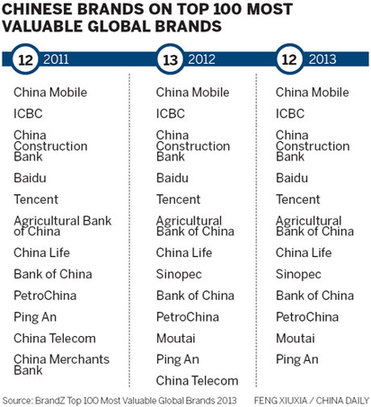
Tencent Holdings Ltd, a major Internet services company in China, has overtaken Facebook Inc in terms of brand value, boosted by its rising revenue and large number of loyal users, according to a survey on the value of the global top brands.
The Shenzhen-based company has seen a 52 percent rise in brand value compared with last year. It continued to draw more users to its instant messaging service and other offerings, and has 800 million active and loyal users, according to the BrandZ Top 100 Most Valuable Global Brands study, commissioned by WPP and conducted by Millward Brown Optimor.
The ranking is compiled using the views of the potential and current buyers of a brand, alongside financial data.
Tencent is among 12 Chinese brands on the list. Chinese companies were found to be declining in terms of brand value compared with their international peers, indicating a bottleneck for the growth of Chinese brands. The figure is a decline from last year's 13 brands, with China Telecom Corp Ltd off the chart.
The 12 Chinese companies - most of them State-owned - have a combined brand value of about $270 billion.
"The quick rebound of international brands revived by the global economic recovery is faster than the growth of Chinese brands, which are largely boosted by domestic demand," said Doreen Wang, head of client solutions at Millward Brown China.
Six of the top 10 Asian brands are from China, surpassing companies from Japan and South Korea.
However, Chinese brands not only need to be more technologically innovative but also more international, Wang said.
Many of China's leading brands continued to appreciate in brand value, despite the economic slowdown.
The country's most valuable brand, China Mobile, increased 18 percent in value. China Mobile won more 3G subscribers than its rivals with its aggressive marketing and is also expanding its 4G network.
Chinese search engine Baidu, also on the list, has seen its brand value decrease 16 percent year-on-year, while the value of high-end liquor maker Moutai rose 3 percent to No 73 despite the government's crackdown on luxury product spending with public funds. Wang said that Moutai's brand value could be affected in the year to come.
Peking Tan, R&D director at Millward Brown Greater China, argued that the government's policy will have a limited impact on the value of global luxury brands because Chinese consumers usually buy such products outside the Chinese mainland, even though the domestic sales of luxury brands have dropped.
On a global level, Apple Inc remains at the top, and is now worth $185 billion, up 1 percent year-on-year, compared with a 51 percent growth from its closest competitor, Samsung Group, which is now No 30 in the global ranking with a brand value of $21 billion.
"Vying for leadership in the smartphone market, Samsung fuelled its huge increase in brand value by balancing a remarkable period of innovation with growing market share - it spent $1.6 billion more on advertising in the last year," said Nick Cooper, managing director of Millward Brown Optimor.
"Despite a more competitive marketplace and other challengers nipping at its heels, Apple's ability to maintain its No 1 position demonstrates the value that having a strong brand brings to business. People still love the brand regardless of its stock price," Cooper said.
The combined value of the Top 100 has grown 77 percent since 2006, with the brands now worth $2.6 trillion.
















 China’s weekly story
China’s weekly story
(2013.5.11-5.17)


![]()
